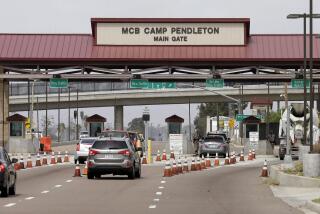Navy Spouses Form Support Network During War
- Share via
SAN DIEGO — Erika is not sure of the location of her husband’s ship, the guided-missile cruiser Antietam. Nor does she know what role he and his shipmates have played since the U.S. began its strikes at terrorist targets.
She prefers it that way. If she doesn’t know, maybe the terrorists do not know either, she reasons.
“Whatever his ship is doing, they’re defending the country,” she said. “Right now I’m running on pride and adrenaline. I’m just happy he’s there, doing what he’s been trained to do.”
It is an ageless story: Sailors, soldiers and Marines go away to fight, and loved ones are left behind to wait, wonder and worry.
Although the Navy has made enormous strides in improving its treatment of families since the days when they were seen as nuisances, there are limits, particularly during wartime.
One improvement is computerized e-mail from ships around the globe to help sailors keep in constant touch with their families.
But since the U.S. began striking targets in Afghanistan, the e-mail from ships near Afghanistan has been shut down.
The military presumes that both its unclassified computer messages and conversations from unencrypted telephones, called sailor phones, can be intercepted.
And so except for a message from the ship’s captain, called a Viper Alert, there have been no messages back to San Diego from the ship, which is part of the battle group formed around the aircraft carrier Carl Vinson in the north Arabian Sea.
Still, the extended family of the Antietam, about 700 relatives and other supporters, are kept updated by e-mails sent by Erika and other wives and by telephone calls.
The support system is part of the Navy’s ombudsman program, in which ship captains are told to consider the needs of family members and keep them informed.
Each ship has a spouse named to field complaints, relay information and act on behalf of families in dealings with the military bureaucracy. Sometimes the ombudsman is a sympathetic listener, other times a problem solver.
The unpaid role usually is taken by the spouse of an officer or a senior enlisted sailor. With the U.S. engaged in a war against terrorism, the ombudsman program is being put to the test, in San Diego and other Navy ports.
“The older spouses are helping bring along the younger spouses, bolstering their spirits, telling them it’s going to be OK,” said Susan, whose husband is on a ship in the Indian Ocean. “The goal is to keep the spouses from feeling so isolated and to allow the sailors to stay focused.”
Lillie Cannon, deputy associate director for Virginia-based National Military Family Assn., said the military realized after the Persian Gulf War that not enough was being done to support families of active-duty personnel, as well as reservists and National Guard troops.
Cannon, a retired Air Force lieutenant colonel, said the attitude when she entered the military two decades ago was the classic one: “If the military wanted you to have a spouse, it would have issued you one.”
“That attitude is not out there anymore,” Cannon said. “Commanders have been told that family readiness equals mission readiness.”
Although the majority of Navy spouses are women, there is a growing number of Navy husbands, who are being included in the outreach program.
Women comprise 14% of the Navy and serve on half of 317 surface ships. On the Antietam, there are four women--all officers, none married--and 386 men.
Spouses asked that their last names not be used for security reasons.
While they await the return of the Antietam, Erika and other wives are preparing a Christmas gift pack for the crew and are inviting public contributions (fsgcoordinator2@hotmail.com). The ship left San Diego in late July and is not expected back until after New Year’s, although the deployment could be extended.
“We always knew it could come to this, but we hoped it wouldn’t,” Erika said. “Our guys are trying to protect this country, and maybe die for it.”
Cindy, whose husband is the ship chaplain, said her husband told her about an increased interest among the crew members in spiritual matters since Sept. 11.
“He’s had a lot of those midnight discussions with guys thinking about death for the first time,” she said. She noted that there is a sense of excitement aboard ship:
“As awful as it is, it [the terrorist attack] galvanized the guys on the ship. This is what they’ve been training for all these years.”
Kelly, whose husband is the senior enlisted man on the Antietam, said her main concern is that the Antietam gets to be part of the offensive. “I’m anxious that the Antietam gets to . . . show what it can do.”
More to Read
Sign up for Essential California
The most important California stories and recommendations in your inbox every morning.
You may occasionally receive promotional content from the Los Angeles Times.










